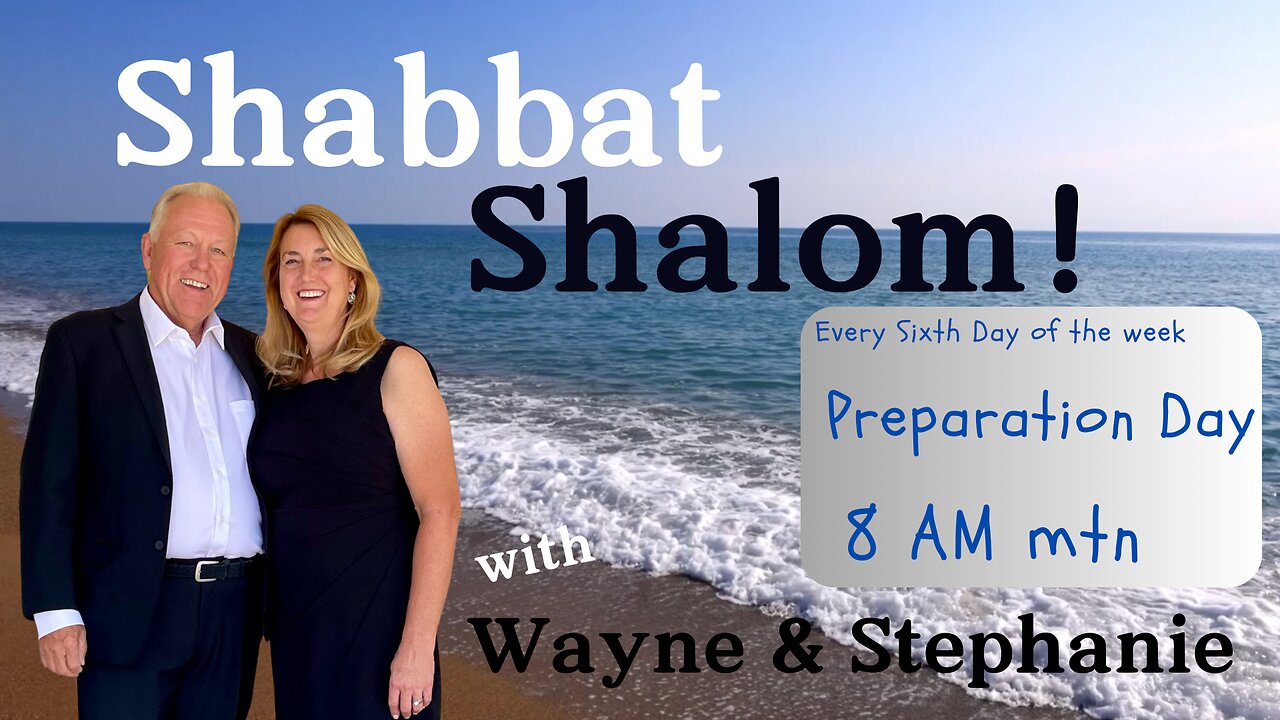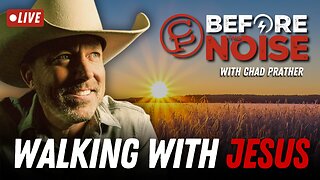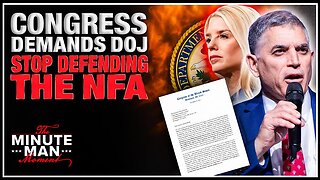Premium Only Content

The Abba Gate
The Abba Gate
with Wayne & Stephanie
There is a pivotal verse that haunts all of Israel and all of mankind, for that matter, in Jeremiah 3:19:
“Then I said, ‘How I would set you among My sons and give you a pleasant land, the most beautiful inheritance of the nations!’ And I said, ‘You shall call Me, My Father, and not turn away from following Me.’
This scripture is like looking through a window into the heart of YeHoVaH, Creator of all that exists, and the desire of the Most High is heard loud and clear. He wants those who love Him to call out to Him like a child to the father that they love.
From the phrase “You shall call Me,” we have one Hebrew word that is like a proclamation. But its context gives the picture of a little child calling out to his/her father for any reason. That child’s heart is calling out with childlike love, emotion, purity, and pointed toward their one and only father.
The next Hebrew word we need to investigate in this message of YeHoVaH’s heart’s desire is the word a’VI, which means my father or daddy. This Hebrew/Aramaic word is an identification of the only one person in all of creation that can be, “my daddy.” A’VI is not a commonly used word with those who speak Hebrew today.
By the second century B.C., this word was developed from Aramaic speaking children to abba and was accepted by Hebrew speaking people as well. In the days of Yeshua, children primarily used the term abba as we would use the word, daddy.
When Yeshua was agonizing in prayer in the Garden of Gethsemane, He cried out in childlike language, calling to His Abba. This calling out to Abba was Yeshua’s emotional dependency and need for His Abba.
“And He was saying, ‘Abba! Father! All things are possible for You; remove this cup from Me; yet not what I will, but what You will.’”
Mark 14:36
We’ll need to slow down a bit when reading this cry from the heart of Yeshua. By doing so, we can capture the childlike purity of love for Abba. Then the question of obedience disappears with “yet not what I will, but what You will.”
Yeshua wasn’t in any hurry when approaching - talking to - praying to - His Father. Listen as He says,
“Abba! Father! All things are possible for You;
remove this cup from Me.”
This is where Abba’s Presence wraps Him – encompasses Him.
Luke 22:43 tells us that an angel from heaven appeared to Him, strengthening Him.
The Presence then causes the obedience phenomenon.
The language of prayer cannot be discounted, even though the heart is the tell-all of effectiveness. Our language matters because it either initiates the intent of our heart or it hides the contents of our hearts. What we say is essential when it comes forth from the heart.
Adam chose fig leaves to hide the nakedness of what was in his heart. Fig leaves are fashionable and come in many colors and styles. We talk and talk, and our words do not reveal what is actually in our hearts. It is the coverup of our identity - what and who our heart says we really are.
Words are not magic. Words can be quite powerful, however. That word which a small child calls its father can ultimately yield the attention of the father to the child.
When we are most vulnerable with our heavenly Father, He yields His great heart towards us, and His Presence empowers us. The decisive moment is when the Father’s great heart of love turns and envelopes us. His attention comes when our defenseless childlike heart is revealed to Him, whereby, “we cry out, ‘Abba, Father.’”
It’s probable that the gospel, according to Matthew, shows this Abba principle in a slightly different way.
“And He went a little beyond them, and fell on His face and prayed, saying, ‘My Father, if it is possible, let this cup pass from Me,
yet not as I will, but as You will.’”
Matthew 26:39
“And he went a little further and bowed his face and said, “My Father, if it is a possible thing, remove this death from me, however, not according to my will, only to yours.”
Matthew 26:39 Hebrew Matthew translation
Herein, Yeshua says, “My Father” with possession. Of course, He would have spoken Hebrew, but the account was translated from Hebrew to Greek and so on. The keyword that shows the relationship of a child to the Father is the possessive word for “My.”
Yeshua says, “My Father,” which leads us to believe that in Hebrew, He may very well have cried out, “Abba.”
There are also numerous times that Yeshua calls to His Father where translators used the Greek word “πατήρ patēr,” but the sentence structure and context in Hebrew sometimes shows that He probably would have said Abba.
Childlikeness takes a prominent position in Kingdom dialogue. I am deeply moved by the way that we see Yeshua treat the children around Him.
“Who then is greatest in the kingdom of heaven?”
Matthew 18:1-5
He uses an actual child in this valuable lesson and explains that a true believer is one who returns to being a child in approach to the Creator, and the Kingdom responds to childlikeness (not childishness).
Malachi reports to us that, “Behold, I am going to send you Elijah the prophet…” and “He will restore the hearts of the fathers to their children and the hearts of the children to their fathers so that I will not come and smite the land with a curse.”
The Hebrew word for “land” is אֶרֶץ erets - the promised inheritance of the beautiful land. I can see the relative words of hearts, fathers, children, and land as paramount aspects of the believer’s relationship with our Abba, Father, and the inheritance of the Kingdom of heaven that He promises us.
That which I have called the “pivotal verse” of Jeremiah shows that the heart of the Father wants His children to love Him personally and purely with affection. Yeshua Messiah teaches that children are the greatest of believers in the Kingdom of heaven. Then the Apostle Paul teaches us that we’ve been given “the Spirit of adoption by whom we cry out, “Abba, Father.”
Our obedience has phenomenal manifestation if we are encapsulated in the love of Abba’s Presence. Our hearts grow big and extend beyond borders, and miracles of the Kingdom of heaven take place.
The evidence tells us that our Creator wants our attention from the place of purity of devotion as a childlike heart, mind, and expressions of love. His entire Kingdom operates on our behalf when we call out, “Abba!”
YeHoVaH has always longed for His children to stay with Him. Let’s look again at this verse in Jeremiah 3:19, that I call pivotal:
“Then I said, ‘How I would set you among My sons and give you a pleasant land, the most beautiful inheritance of the nations!’ And I said, ‘You shall call Me, My Father, and not turn away from following Me.’”
This verse reveals YeHoVaH’s heart. He desires (longs) to keep His children close, and He wants to give them a pleasant and beautiful land. The closeness comes by our desire to not leave His presence and to call upon Him as Abba - Daddy.
The land is real, but it also makes a great analogy of our Kingdom prosperity.
All creation has the element of the Creator’s voice in it. Its planned purpose is the will of the heart of the Father of all creation. All creation works intricately together from the heart of the Father of creation.
One might say that it is the organics of creation that take place because of the imprint of the Creator’s will. It is like a massive blueprint for eternity and is not dissimilar to our understanding of how DNA is a kind of blueprint.
Standsure.net
Books by Wayne & Stephanie Anderson are available here: Standsure.net/bookin
-
 LIVE
LIVE
Wendy Bell Radio
4 hours agoHouston, We Have A Problem
4,428 watching -
 DVR
DVR
Chad Prather
15 hours agoHearing God, Confronting Deception, and Walking in Spirit-Filled Authority
24.7K13 -
 LIVE
LIVE
LFA TV
5 hours agoLIVE & BREAKING NEWS! | FRIDAY 12/19/25
2,970 watching -
 LIVE
LIVE
Game On!
17 hours ago $1.93 earnedNFL Week 16 BEST BETS Revealed NOW!
574 watching -
 1:01:24
1:01:24
Crypto Power Hour
11 hours ago $2.75 earnedHow Crypto Address Poisoning Attacks Work
24.4K8 -
 9:03
9:03
Tactical Advisor
14 hours agoWhy You Should Get a Suppressor Before 2026
11K9 -
 17:47
17:47
Degenerate Jay
1 day ago $1.34 earnedThis Game Deserved 2025 Game Of The Year - Dispatch
12.4K1 -
 25:55
25:55
Welker Farms
19 hours ago $0.93 earnedI'd Say We Make A Pretty Good Team Fix'n These Tractors
11.2K3 -
 8:01
8:01
Gun Owners Of America
16 hours ago40+ Members of Congress Warn DOJ & ATF To Stop Defending the NFA!
14K3 -
 2:05:46
2:05:46
BEK TV
1 day agoTrent Loos in the Morning - 12/19/2025
12.2K